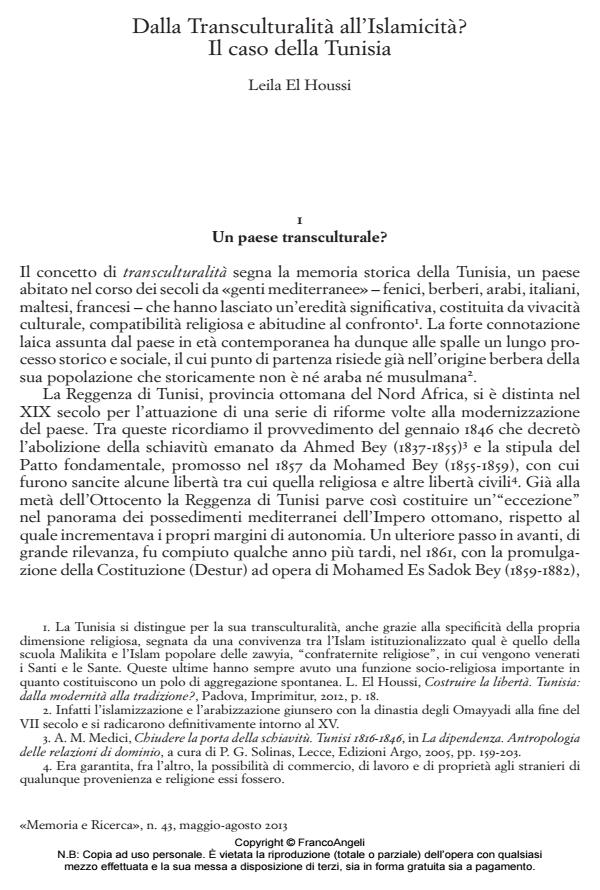Dalla Transculturalità all’Islamicità? Il caso della Tunisia
Titolo Rivista MEMORIA E RICERCA
Autori/Curatori Leila El Houssi
Anno di pubblicazione 2013 Fascicolo 2013/43
Lingua Italiano Numero pagine 10 P. 85-94 Dimensione file 111 KB
DOI 10.3280/MER2013-043006
Il DOI è il codice a barre della proprietà intellettuale: per saperne di più
clicca qui
Qui sotto puoi vedere in anteprima la prima pagina di questo articolo.
Se questo articolo ti interessa, lo puoi acquistare (e scaricare in formato pdf) seguendo le facili indicazioni per acquistare il download credit. Acquista Download Credits per scaricare questo Articolo in formato PDF

FrancoAngeli è membro della Publishers International Linking Association, Inc (PILA)associazione indipendente e non profit per facilitare (attraverso i servizi tecnologici implementati da CrossRef.org) l’accesso degli studiosi ai contenuti digitali nelle pubblicazioni professionali e scientifiche
Characterized by strong cross-culturalism, thanks to a social stratification and cultural dynamism that provided fertile terrain for modernization, Tunisia underwent a process of "secularization from above" promoted by Tunisia’s President Bourguiba following the country’s independence from France in 1956. Nevertheless, this secularism succeeded in maintaining a respect for Islam allowing Tunisia to be identified as an Islamically secular nation, differentiating itself from other Arab countries. With Ben Ali’s rise to power, the new government made every effort to be viewed as a bastion of secularism by the Western world. At the same time, the authoritative regime sought to suppress opposing forces, which had found support in many sections of society rediscovering religious elements as a tool of resistance. These elements, however, were not seen in the revolt against Ben Ali’s regime in January 2011 but rather surfaced later in the elections held in October 2011 with the victory of the Islamic Party Ennahda. After more than 50 years as a secular nation, Ennahda seems to be moving the country along a very different path than the one set by Bourguiba. One wonders whether Tunisia will continue to be Islamically secular or if the end result will be a country where Islam prevails over secularism.
Parole chiave:Tunisia, Islam, secularism, insurrection, Ennahda, Arab spring
- The Livornese Jewry in Tunis: Experiences of the Diasporic Community in the Unification of Italy and Beyond, 1830s-1939 Nimrod Koren, in SSRN Electronic Journal /2018
DOI: 10.2139/ssrn.3218749 - States, Actors and Geopolitical Drivers in the Mediterranean Renata Pepicelli, pp.275 (ISBN:978-3-030-68999-5)
- Joint Ownership in EU-Tunisia Relations Federica Zardo, pp.39 (ISBN:978-3-030-30798-1)
Leila El Houssi, Dalla Transculturalità all’Islamicità? Il caso della Tunisia in "MEMORIA E RICERCA " 43/2013, pp 85-94, DOI: 10.3280/MER2013-043006